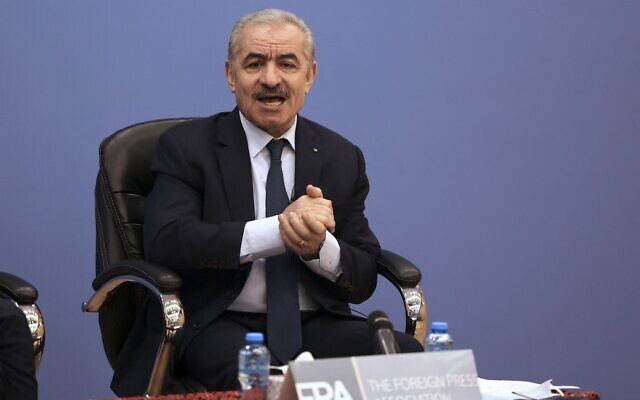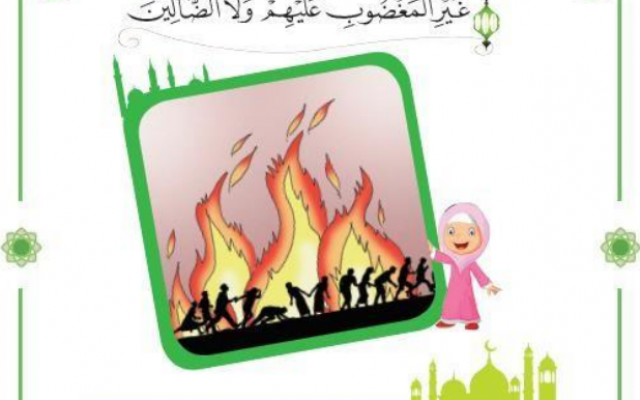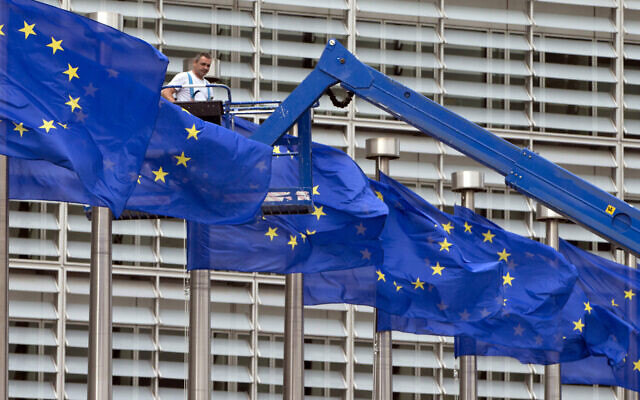After two and a half years without European Union aid, the Palestinian Authority hopes to see hundreds of millions of euros in funding resume following a visit by EU Commissioner Ursula Van der Leyen to Ramallah, planned for Tuesday.
“I hope that she comes with the following news: This matter has ended and shall not return,” PA Prime Minister Mohammad Shtayyeh told official Palestine TV on Saturday night.
European aid to the Palestinians has ceased as Brussels debated whether to condition some aid to the PA on the removal of alleged incitement from Palestinian textbooks.
PA textbooks have long been a subject of controversy. Watchdogs have slammed the curricula for allegedly promoting violence and glorifying terrorism. The PA defends them as a faithful reflection of their national narrative.
Van der Leyen is set to land in Tel Aviv on Monday for a series of meetings with Israeli and Palestinian officials. She will meet with Foreign Minister Yair Lapid on Monday before heading off to Ramallah to meet with Shtayyeh on Tuesday.
Get The Times of Israel's Daily Edition by email and never miss our top stories
A diplomatic source who spoke to The Times of Israel said they could not confirm whether Van der Leyen intended to renew the funding following Tuesday’s meeting, but that “there is much hope.”
“There were interventions from European leaders and diplomats to resolve the issue. This is to everybody’s benefit – including Israel’s,” said the source, who spoke on condition of anonymity.

Palestinian Authority Prime Minister Mohammad Shtayyeh holds a briefing with foreign press at his office in the West Bank city of Ramallah, November 10, 2021. (Abbas Momani/AFP)
As for whether the renewed funding would be conditioned on changes to Palestinian textbooks, the source said: “That is the big question.”
The European Union, the PA’s largest donor, helps to pay the salaries of the PA’s many civil servants, which constitutes a significant chunk of the West Bank economy. Between 2008 and 2020, Brussels sent around $2.5 billion in direct budget support to the PA.
In late 2021, senior EU Commission official Oliver Varhelyi – a conservative appointee close to Hungarian strongman Viktor Orban – proposed conditioning about $10 million of the EU’s aid to the PA on reforming the textbooks.
European states have been debating the measure heatedly ever since, with strong feelings for and against it in Brussels. The delay compounded a two-year period in which the funds were delayed for technical reasons.
“The broader question is: Should such substantive financial aid be linked to one element of the relationship between Europe and the Palestinians?” one European diplomat critical of the proposal said in a February interview.
By contrast, the IMPACT-se nonprofit, which regularly issues reports analyzing Palestinian curricula, hailed the proposal.

Illustrative: An image of a girl smiling as ‘heretics’ are burned in a Palestinian textbook. (IMPACT-SE)
“There is now too much opposition from the European Parliament, the Commission, and the Council itself to transfer massive sums of money to the PA while it brazenly continues to produce antisemitic and violent textbooks,” IMPACT-se director Marcus Sheff said in March.
After months of bureaucratic deliberations, the decision to renew the funding or not now rests with Van der Leyen, who could choose to override Varhelyi or seek to push a compromise through the European Commission, officials said.
Senior Palestinian diplomat Ahmad al-Deek told The Times of Israel that the PA estimated that the funding crisis would be over in a matter of days.
“The expectation is that things are moving towards a resolution. The matter is now with Commissioner [Van der Leyen] — and we hope she brings us good news,” al-Deek said.
Any degree of conditionality would be unacceptable to Ramallah, a Palestinian Authority official said in a phone call.
“Our hope is that the funding will resume without conditions,” said the official, who spoke on condition of anonymity.
Ramallah was plagued by repeated financial difficulties and dwindling international support, making the loss of EU funding a serious blow. Both Palestinian and Israeli officials have warned the PA could face fiscal collapse, in part due to the lack of aid.
Many PA civil servants had to get by on partial or delayed wages for months. The PA fell ever further behind on payments to Israel for electricity and water. And the PA has struggled to pay medical costs for Palestinians seeking treatment in Israeli hospitals.
In an attempt to alleviate the growing fiscal crisis, Israel loaned over NIS 600 million ($176 million) to Ramallah last year. But over the same period, Israel has deducted a similar amount to penalize the PA for paying stipends to the families of Palestinians killed or jailed by Israeli authorities, including convicted terrorists — a PA policy Israel says incentivizes violence.

In this June 23, 2016 file photo, a worker on a lift adjusts the EU flags in front of EU headquarters in Brussels. (AP Photo/Virginia Mayo, File)
Palestinian Authority officials have repeatedly said that they will not accept conditioning the aid on changes to Palestinian textbooks. The PA has repeatedly rejected the accusation that its textbooks promote violence and terrorism.
“We are made to explain and justify what appears in our educational materials, even though it explains our narrative and our national identity. Meanwhile, no one demands to review Israeli curricula and media, so the world can see the true incitement by Israeli institutions,” PA President Mahmoud Abbas said in a speech to the United Nations last year.


